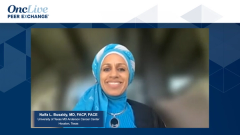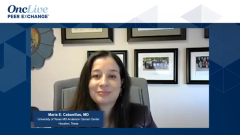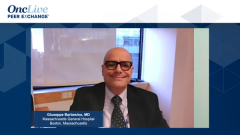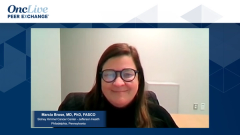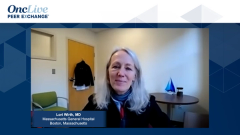
Thyrotropin Suppression for Differentiated Thyroid Cancer
The pros and cons of thyrotropin suppression as treatment for patients with differentiated thyroid cancer.
Episodes in this series

Lori Wirth, MD: Thank you, Naifa, for going through our initial thoughts about treatment. I do a lot of active surveillance, although I don’t know if we can continue to call it that because the ATA [American Thyroid Association] guidelines are going to be using active surveillance for following small thyroid cancers. But we decided that we didn’t want to use watchful waiting, so we turned to using active surveillance. And now I don’t know what we’re going to call it. But I do a lot of that with patients who do have iodine-refractory metastatic disease. Thyroid cancer is one of the few cancers where we do follow patients, and apart from TSH [thyrotropin] suppression, we don’t do any other active therapy. Let’s talk about this a little. But first I want to ask one of the endocrinologists, does TSH suppression really matter? Does it work?
Giuseppe Barbesino, MD: As with radioactive iodine, it does work in most differentiated thyroid cancers, which are the ones that are less in need of treatment. That’s the conundrum that we always face. The more differentiated the cancer, the less likely it is to kill the patient, at the same time, it’s more likely to respond to such treatment. It does work in a number of cases, certainly. There is the original presentation of a young girl who presented with lung metastasis from thyroid cancer, had surgery, and was left without levothyroxine for a couple of years until treatment became available. And her lung metastasis shrunk immediately after restoration of a normal TSH. This really proves that TSH is an incredible growth factor even for advanced thyroid cancer that may not be well differentiated.
Whether bringing the TSH below the normal range in all cases is necessary, clearly that’s not the case. We have to balance that with the risks from TSH suppression, which is minimal in younger patients. Someone who is younger than 50 isn’t likely to have any bad consequences from TSH suppression, so we do suppress them. On the other hand, in people who are older, those who are 75, maybe they have a detectable thyroglobulin but it’s not progressing, etc, suppressed TSH can cause atrial fibrillation, so the risk/benefit analysis is much less in favor of TSH suppression. I try not to be incredibly fanatic with TSH suppression in those age ranges. But we do see that thyroglobulin climbs when the TSH is released. Even in some cases where the TSH goes from, let’s say, 0.1 to 3 [mU/L], you see the thyroglobulin climb. So, there is certainly sensitivity of the tissue to that.
Maria E. Cabanillas, MD: Lori, I would actually say that the more controversial question is, should we be doing this in patients who are on effective systemic therapy? Should we be really suppressing their TSH, like full suppression, which is what we typically do? And because we have other adverse events we’re dealing with on top of possible issues with atrial fibrillation or worsening of their hypertension, I don’t know if we need to be doing that if they’re on a therapy that’s effective. I don’t know the answer to that, I just thought I’d throw it out there.
Marcia Brose, MD, PhD, FASCO: I think one of the things that I’ve been taught by the endocrinologists at my institutions is that it’s hard to walk away from something where there’s actually been a proven survival benefit, which was about 15%. I think that it’s harder to walk away from it. But if somebody has atrial fibrillation or any other issues, I think modifying that suppression to maybe 0.5 instead of 0.1 [mU/L], and even a little bit higher if we have to, makes sense. But I still try to do it because I don’t want to not give them an opportunity to have improved survival. I don’t know if it’s additive. We don’t really have the data to say that it doesn’t matter anymore.
Naifa L. Busaidy, MD, FACP, FACE: I just want to echo what Marcia said as well. We do have good data in stage III, IV disease. The TSH suppression is associated with improved overall survival. And there are very little data, as we’re going to talk about later, about things that change overall survival. I do think that we should. We don’t have to suppress as much as we used to in the olden days, not to undetectable TSH, but we should keep it at least less than 0.1, or 0.1 to 0.5 [mU/L], depending on where we are. Because again, it’s a small percentage of patients who need systemic therapy, and for the vast majority of those patients with residual recurrent disease, TSH suppression is going to help them.
Transcript edited for clarity.


